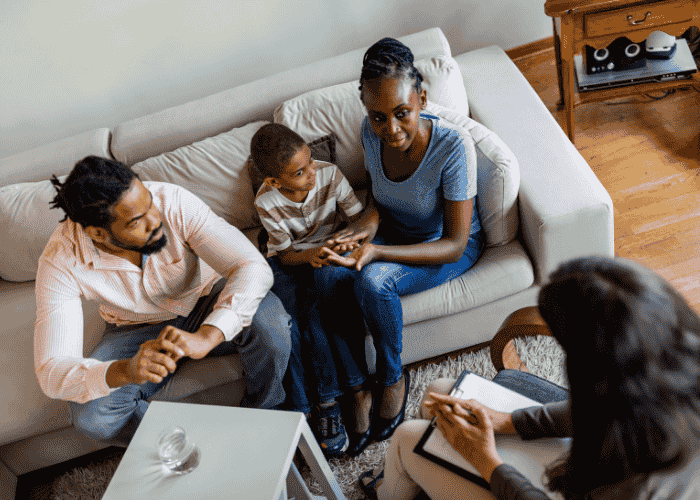Social & Interpersonal Difficulties in Adults: Signs, Causes, & Therapy for Social Issues

For many adults, navigating social and interpersonal situations doesn’t always come easily. Some of us feel anxious in conversations, struggle to make or keep friendships, or get caught in repeating patterns of conflict. Others may long for deeper connections, but feel isolated or misunderstood. While these challenges are common, they can also have a big impact on mental health and relationships.
Social and interpersonal difficulties do not mean you’re “weak” or a “failure.” They often stem from a complex mix of experiences, personality traits, and underlying mental health conditions. But when left unaddressed, these struggles can create a cycle of disconnection and self-doubt.
If social issues are affecting your relationships and life in general, a mental health professional can offer empathetic understanding and guidance. This page can also work as a useful guide for navigating interpersonal difficulties in adults, as it explores:
- How to understand social and interpersonal difficulties in adults
- Signs of social challenges
- Common causes of social and interpersonal problems
- How these difficulties can affect daily life
- Behavioral therapy for social skills
- Ways of coping with social anxiety and interpersonal challenges
- Answers to commonly asked questions about adult social support

What Are Social & Interpersonal Difficulties in Adults?
When we talk about social and interpersonal challenges, we’re referring to how people connect, communicate, and relate to others. These struggles can take many forms. Some people avoid social settings altogether, while others experience frequent misunderstandings or conflict in their relationships.
While we’ll cover both social and interpersonal difficulties, there are some differences between the two. And it’s also possible to have one and not the other. The following are the main differences between both:
Social difficulties are usually about how we understand and apply the “rules” of social interaction. When we don’t know how to do this, it can lead to feeling anxious before conversations, not knowing what to say, or worrying about how we’re being perceived.
Interpersonal difficulties, on the other hand, are about the patterns that show up between us and the people in our lives (family, friends, and intimate partners). These challenges look like recurring conflict, problems with trust, or trouble maintaining long-term relationships.
Of course, challenges such as these don’t always look the same for everyone. For some, they may be linked to a specific diagnosis, such as social anxiety disorder, depression, or autism spectrum disorder. For others, they may reflect learned behaviors from childhood environments, unresolved trauma, or stressful life changes.
Signs of Interpersonal Difficulties and Social Symptoms in Adults
When you recognize the signs of social and interpersonal struggles, you can begin to understand how to make meaningful changes. Yet these challenges often show up in subtle ways, leaving people feeling disconnected or isolated. So it can be good to know what to look out for.
Some of the signs of interpersonal and social difficulties might include:
- Difficulty starting or maintaining conversations: This could look like feeling anxious about small talk, struggling to keep a conversation going, or avoiding speaking up in groups.
- Challenges with nonverbal communication: These challenges might manifest as misreading facial expressions, avoiding eye contact, or having trouble with tone of voice – making conversations uncomfortable.
- Having frequent misunderstandings: Such as having others misinterpret your intentions or finding yourself misreading theirs.
- Feeling isolated or rejected: This symptom can occur even when surrounded by others, leading to feelings of being left out, unseen, or disconnected from the group.
- Experiencing emotional discomfort: Feelings such as shame, irritability, or social anxiety can accompany the previous symptoms, sometimes leading to avoidance of social opportunities altogether.
These signs don’t mean you’re “bad” at relationships or destined to remain disconnected. Instead, they are signals that something in your social or emotional world may need extra support.
Common Causes of Social and Interpersonal Struggles
There is no single cause for social and interpersonal difficulties in adults. Instead, they’re usually the result of a combination of factors that can lead to experiencing these challenges. Some of the most common causes include:
Mental Health Conditions
Anxiety disorders, ADHD, depression, and autism spectrum disorder can often affect how people process social cues, manage emotions, or regulate attention in conversations.1 Trauma can also leave lasting effects, making trust and closeness more difficult.
Environmental Factors
Early experiences can shape how we relate to others. For example, if you grew up in environments of neglect, bullying, or inconsistent caregiving, you may struggle with forming safe, supportive relationships later on.
Learned Behaviors
If healthy communication and conflict resolution were never modeled to you growing up, you might rely on unhelpful strategies that can create friction in relationships. These strategies may include withdrawal, people-pleasing, or becoming defensive.
Cultural Influences
Different cultural norms around communication and displays of emotion can create misunderstandings, especially in diverse workplaces or communities. Social stigma around seeking help may also prevent people from addressing these difficulties.
By understanding these potential causes, you can stop seeing social and interpersonal challenges as a personal flaw. Instead, you can start to view them as responses shaped by past experiences, current challenges, and the need for support.
How Social and Communication Difficulties Affect Daily Life
Social and interpersonal struggles don’t just happen in isolation; they can ripple out into nearly every area of your life. Many adults find that ongoing challenges with communication, trust, or connection gradually shape the way they live, work, and relate to others.
Here’s how these challenges could impact your daily life:
- Experiencing struggles with trust, conflict resolution, or emotional expression can strain romantic relationships, friendships, and family bonds. Over time, these issues can lead to cycles of loneliness, resentment, or repeated breakups.
- Many adults might pull away from social interactions and opportunities, skipping events or declining invitations to avoid discomfort. While withdrawal can bring temporary relief, it also tends to increase Isolation.2
- Loneliness, rejection, and repeated conflict can increase the risk of depression and anxiety.3 Additionally, the fear of making mistakes in social situations may also lead to heightened self-consciousness or chronic stress.
- Research shows that social disconnection can impact the body, contributing to issues like high stress, poor sleep, and weakened immune function. It can also increase the risk of health concerns like heart disease, stroke, and diabetes.4
These impacts are significant, but they don’t have to be permanent. With the right tools and therapeutic support, adults can learn healthier ways of relating, reduce stress, and begin building more rewarding connections in both personal and professional life.
Therapy for Social Issues
Social and interpersonal challenges can feel overwhelming, but therapy offers practical tools to build healthier connections and improve confidence. Below are some of the most effective mental health resources for managing interpersonal and social difficulties:
Cognitive Behavioral Therapy (CBT)
CBT focuses on the connection between thoughts, feelings, and behaviors. For adults who struggle with social anxiety, negative self-talk, or fear of rejection, CBT can help identify unhelpful thought patterns and replace them with more balanced, realistic ones. Over time, this process makes it easier to approach conversations, manage conflict, and feel more comfortable in social situations.5
Interpersonal Therapy (IPT)
IPT centers on relationship challenges and mental health difficulties, and how they interact. Many people with interpersonal difficulties find themselves repeating the same conflicts or struggling to maintain relationships. IPT provides a structured way to explore these patterns, understand their roots, and develop new strategies for healthier communication and connection.
Group Therapy
While one-on-one therapy is valuable, group therapy can offer something unique: the chance to practice social skills in real time. In a supportive group, you can role-play conversations, share experiences, and receive feedback from both peers and a therapist. This safe environment can help reduce feelings of isolation and build confidence for everyday interactions.
Social Skills Training
For adults who feel they “missed out” on learning certain social skills, structured training can be life-changing. Through role-playing, coaching, and practice exercises, you can learn skills that can improve mental health and social behavior, like assertiveness, active listening, and nonverbal communication. These tools can then be applied in work settings, friendships, and romantic relationships.
Mindfulness and Somatic Approaches
Social challenges often come with strong physical responses: racing heart, tense muscles, or trouble breathing. Mindfulness and somatic therapies teach adults to notice these signals without becoming overwhelmed by them. Practices like grounding exercises, breathwork, and mindful awareness help regulate emotions, reduce social anxiety, and increase presence in relationships.6
Couples or Family Therapy
For many adults, difficulties show up most intensely in their closest relationships. Couples or family therapy can create a space to address recurring conflicts, rebuild trust, strengthen communication, and forge emotional regulation in relationships. With a therapist’s guidance, you and your partners, friends, and family members can better understand one another and break out of unhealthy relational cycles.
Practical Strategies for Social Skills Improvement
Alongside therapy, there are everyday practices that you can use to strengthen your relationships and feel more at ease socially. These strategies are simple yet effective, and when practiced consistently, they can make social interactions feel less intimidating and more rewarding.
Practical strategies for improving social skills include:
1. Practicing Active Listening
One of the most powerful ways to connect with others is by listening fully. This means giving someone your complete attention, making eye contact, and reflecting back what you hear. Active listening not only helps prevent misunderstandings but also makes the other person feel valued and understood.
2. Developing Assertive Communication
Being assertive is different from being aggressive. Assertive communication means expressing your needs and boundaries clearly, while also respecting those of others. Practicing phrases like “I feel…” or “I need…” can help reduce conflict and build healthier, more balanced relationships.
3. Seeking Out Safe Social Opportunities
Social skills grow stronger with practice. Look for structured environments where connection is built in, such as support groups, classes, or volunteer opportunities. These settings can provide a safe place to try out new skills without the pressure of high-stakes interactions.
4. Building Self-Compassion
Harsh self-criticism often fuels social anxiety and isolation. But learning to be kinder to yourself – even when interactions don’t go perfectly – can help break the cycle of shame and avoidance. Self-compassion allows room for growth while reminding you that everyone struggles socially at times.
By weaving these strategies into daily life, adults can begin to shift their relationship patterns. Combined with therapy, they provide a strong foundation for building confidence and creating connections that feel supportive, authentic, and lasting.
Mission Connection: Compassionate Support for Overcoming Interpersonal Challenges
Living with social or interpersonal struggles can feel highly discouraging, especially when it seems like connecting comes easily to others. At Mission Connection, we understand that these challenges are complex and deeply personal. This is why we take an integrative, compassionate approach to care – one that recognizes both the roots of social difficulties and the possibilities for growth.
Our team provides evidence-based therapies such as CBT, internal family systems therapy, EMDR, and mindfulness therapy to help clients build confidence, regulate emotions, and develop healthier ways of relating to others. For those who could benefit from practicing skills in safe, supportive settings, we also offer group therapy and peer-based programs that make skill-building more practical and encouraging.
Most importantly, you don’t have to face these challenges alone. If you’re ready to take the next step toward more meaningful relationships and a stronger sense of self, contact Mission Connection today. Together, we can help you break free from isolation, strengthen your resilience, and create the fulfilling connections you deserve.

FAQs About Social & Interpersonal Difficulties
If you still have some questions after reading the information in this article, the following responses to FAQs about social and interpersonal difficulties in adults may help.
How Do I Know if My Struggles Are Part of a Mental Health Condition or Just Personality Differences?
It can be difficult to tell if your struggles are related to a mental health condition or personality, or in some cases, both. If you’re finding that you’re experiencing a lot of distress around your social interactions or they’re repeatedly affecting your relationships, you might want to seek out a professional evaluation. A therapist can help clarify whether these difficulties are tied to a mental health condition or reflect learned behaviors and patterns. Either way, these challenges can be improved with support.
How Can I Feel Less Anxious in Social Situations?
You can feel less anxious in social situations by exposing yourself to safe, easily manageable situations and using tools like deep breathing, grounding, or mindfulness to reduce anxiety. Over time, combining therapy with these strategies can make social interactions feel less overwhelming.
How Does Mission Connection Help Adults With Social and Interpersonal Issues?
Mission Connection offers treatment plans that blend evidence-based therapies with compassionate, trauma-informed care that are focused on your individual needs. Our programs help you to understand the roots of your struggles, practice new skills, and build confidence in real-life interactions. Overall, our focus is not only on symptom relief but also on creating lasting change through stronger, healthier relationships.
References
- Barnett, P., Steare, T., Dedat, Z., & et al. (2022). Interventions to improve social circumstances of people with mental health conditions: A rapid evidence synthesis. BMC Psychiatry, 22, 302. https://doi.org/10.1186/s12888-022-03864-9
- Kupferberg, A., & Hasler, G. (2023). The social cost of depression: Investigating the impact of impaired social emotion regulation, social cognition, and interpersonal behavior on social functioning. Journal of Affective Disorders Reports, 14, 100631. https://doi.org/10.1016/j.jadr.2023.100631
- Mushtaq, R., Shoib, S., Shah, T., & Mushtaq, S. (2014). Relationship between loneliness, Psychiatric Disorders and Physical health ? A review on the psychological aspects of loneliness. JOURNAL OF CLINICAL AND DIAGNOSTIC RESEARCH. https://doi.org/10.7860/jcdr/2014/10077.4828
- Centers for Disease Control and Prevention. (n.d.). Health effects of social isolation and loneliness: Risk factors. https://www.cdc.gov/social-connectedness/risk-factors/index.html
- Kaczkurkin, A. N., & Foa, E. B. (2015). Cognitive-behavioral therapy for anxiety disorders: an update on the empirical evidence. Dialogues in Clinical Neuroscience, 17(3), 337–346. https://doi.org/10.31887/dcns.2015.17.3/akaczkurkin
- Kaczkurkin, A. N., & Foa, E. B. (2015). Cognitive-behavioral therapy for anxiety disorders: an update on the empirical evidence. Dialogues in Clinical Neuroscience, 17(3), 337–346. https://doi.org/10.31887/dcns.2015.17.3/akaczkurkin
